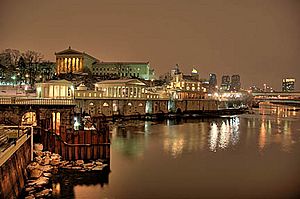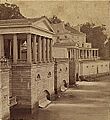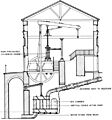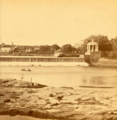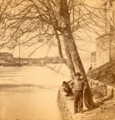Fairmount Water Works facts for kids
|
Fairmount Water Works
|
|

Fairmount Water Works and the east bank of the Schuylkill River in December 1984
|
|
| Location | Philadelphia, Pennsylvania, U.S. |
|---|---|
| Built | 1812–1815 |
| Architect | Frederick Graff et al. |
| Architectural style | Mid 19th Century Revival, Palladian |
| NRHP reference No. | 76001662 |
Quick facts for kids Significant dates |
|
| Added to NRHP | May 11, 1976 |
| Designated NHL | May 11, 1976 |
The Fairmount Water Works in Philadelphia, Pennsylvania, was a very important place that helped bring clean water to the city. It was Philadelphia's second big water system. It was designed by Frederick Graff in 1812 and finished in 1815. It worked until 1909. People loved its beautiful design, and it became a popular place to visit.
Today, it has a restaurant and a special center. This center teaches visitors about how the waterworks worked. It also explains the history of water in the area. Because of its amazing design and new engineering ideas, it became a National Historic Landmark in 1976. It was the first water system in the country to use big paddle wheels to move water.
Contents
History of the Water Works
Why Philadelphia Needed Clean Water
In the late 1700s, Philadelphia faced a big problem. Many people got sick from diseases like yellow fever. At the time, people thought these sicknesses came from dirty water or rotting trash in the streets. To solve this, city leaders created a "Watering Committee."
The first water system was designed by Benjamin Latrobe in 1799. It used two steam engines to pump water from the Schuylkill River. The water went into two wooden tanks. From there, it flowed through wooden pipes to homes. This system often broke down. If one engine stopped, the whole city lost its water supply.
The committee needed a better plan. They chose John Davis and Frederick Graff. Graff was Latrobe's student and later became the chief engineer. They were asked to design a new waterworks. This new system needed to provide enough water for the growing city. It also needed to store more water.
Building the Fairmount Water Works
Construction on the Fairmount Water Works began in 1812. It was finished in 1815. It was built on the east bank of the Schuylkill River. At first, it had a large reservoir that could hold 3 million gallons of water. This reservoir was on top of Faire Mount, where the Philadelphia Museum of Art is today. There was also a pump house with two steam engines to move the water.
Between 1819 and 1821, a long dam was built across the Schuylkill River. This dam helped guide water to a Mill House. In 1822, three large water wheels replaced the steam engines. Later, special Jonval turbines were used to lift water. These turbines were in a new Mill House and the old one.
A Popular Tourist Spot
The Fairmount Water Works looked like a beautiful classical building. This hid the fact that it was an industrial site. Because of its beauty and riverside location, it became a popular place for tourists. Famous visitors included Charles Dickens, who admired its design.
Another English visitor, Fanny Trollope, wrote about it in her 1832 book Domestic Manners of the Americans:
There is one spot, however, about a mile from the town, which presents a lovely scene. The water-works of Philadelphia have not yet perhaps as wide extended fame as those of Marley, but they are not less deserving it. At a most beautiful point of the Schuylkill River the water has been forced up into a magnificent reservoir, ample and elevated enough to send it through the whole city. The vast yet simple machinery by which this is achieved is open to the public, who resort in such numbers to see it, that several evening stages run from Philadelphia to Fair Mount for their accommodation.
The Fairmount Water Works stopped operating in 1909. By then, newer and more advanced water facilities had been built.
The Fairmount Dam
The Fairmount Dam was completed in 1822. It stretched across the river at an angle. It directed water into the Water Works and also acted as a spillway. The Schuylkill is a tidal river, meaning its water level changes with the ocean tides. The dam stopped salty water from the Delaware River from mixing with the fresh water. Above the dam, it created a calm area called "Schuylkill Pond." This area was used for fun activities like boating.
What Happened After 1909
After closing in 1909, the Fairmount Water Works buildings were used for different things. It was home to the Philadelphia Aquarium, which closed in 1962. It also had an indoor swimming pool, which closed in 1973.
People have worked hard to make the waterworks a popular tourist spot again. Even after a serious fire, restoration efforts continued. Today, it has an interpretive center. Tours are given regularly. Its location near Boathouse Row and the Philadelphia Museum of Art helps attract visitors.
The Fairmount Water Works buildings now house the Fairmount Water Works Interpretive Center (FWWIC). This is a hands-on science and environmental education center. It was created by the Philadelphia Water Department. The FWWIC offers interactive exhibits, talks, events, and programs for schools.
Recent Years
In December 2004, Michael Karloutsos signed a 25-year lease for the site. After a big renovation, he opened the Water Works Restaurant and Lounge on July 20, 2006. This restaurant closed in 2015. Soon after, an event venue opened in its place.
See also
- Fairmount Park
- List of crossings of the Schuylkill River
- List of National Historic Landmarks in Philadelphia
- List of tourist attractions in Philadelphia
- Louis Wernwag
- National Register of Historic Places in North Philadelphia
- Schuylkill Canal
Images for kids
-
Fairmount Water Works, Philadelphia, between 1860 and 1880
-
Boathouse Row and Fairmount Water Works from Lemon Hill
(circa 1872–1874) -
Current dam (built in 1928) and Boathouse Row in the background





